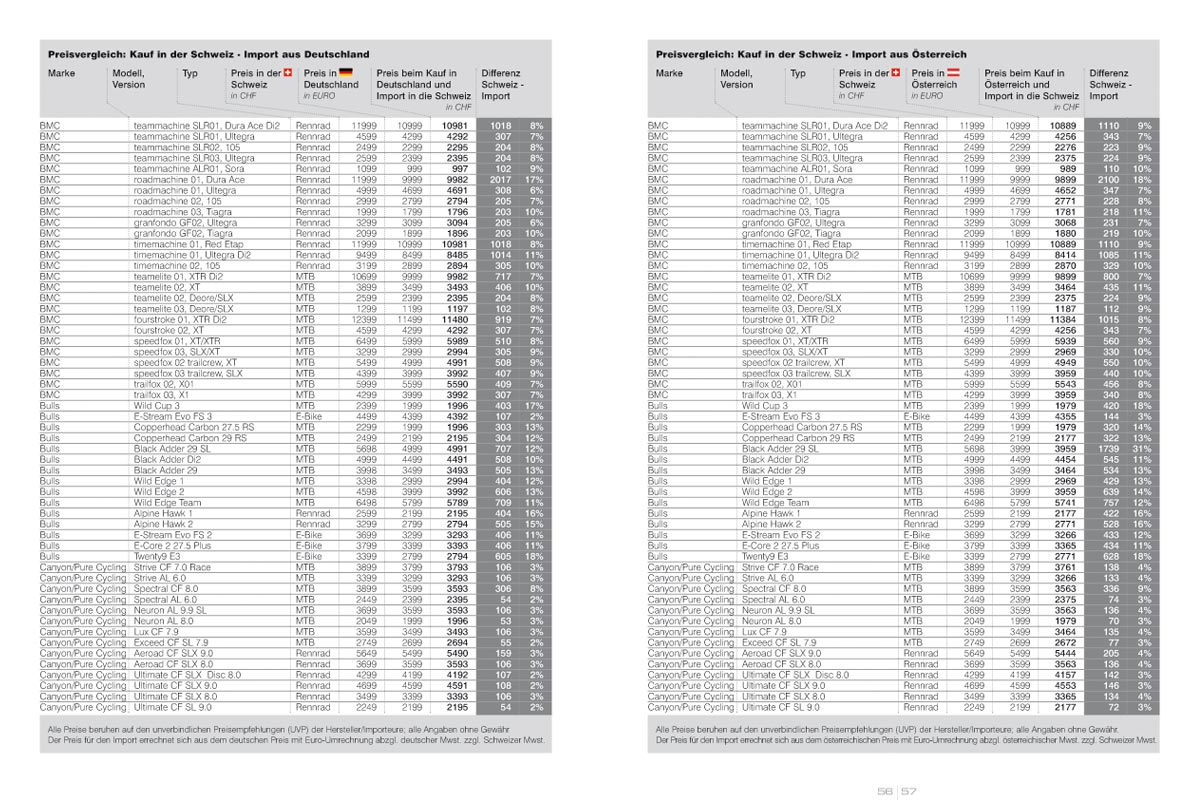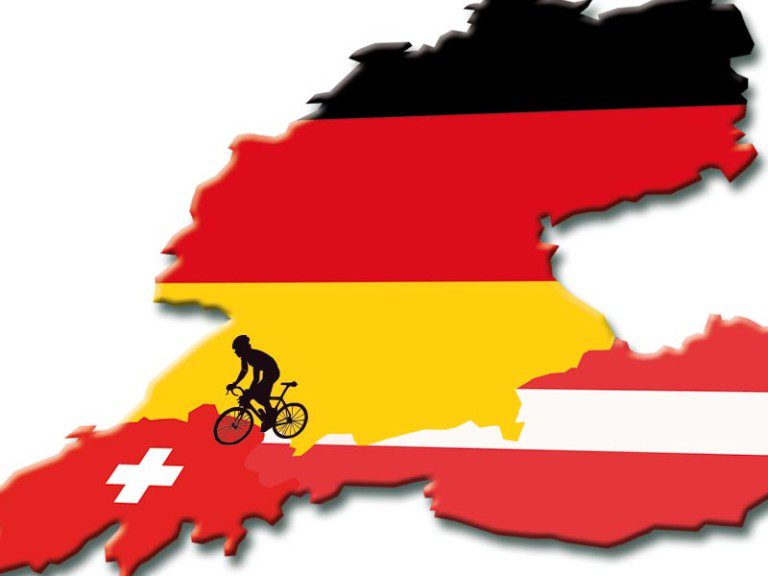Nothing seems more important to consumers today than price. It seems to have become the most important criterion when buying. Never before have consumers been so price-sensitive. This is due not only to a stagnating economy in Europe, but also to the global transparency of the market created by the Internet. It has never been easier for consumers to compare prices. Local retailers are under pressure as never before due to Internet offerings and nearby foreign countries. How does it look for the bicycle market? We compared the prices of German-speaking Europe for a buyer from Switzerland and discovered some surprising things.
by Rolf Fleckenstein, Henning Heilmann
If you make your way to Constance or Waldshut today, you will be amazed at all the Swiss license plates on the cars you see on the way to the supermarkets and shopping centers. It's not hard to see that certainly every second car comes from Switzerland. What is behind this flight of Swiss consumers to neighboring countries? At first glance, one could understand it if residents from areas close to the border set off for less expensive foreign countries, but quite a few trips are made through Switzerland to save money. Only those who have been shopping in neighboring Germany understand the motivation. Meat half as expensive or even cheaper than in Switzerland, coffee, dessert, bread, milk, medicines, etc. half as cheap or even cheaper, these are good reasons for shopping tourism. 1 kg of beef fillet costs in Switzerland between CHF 70.00 - 120.00, in Germany between Euro 20.00 - 35.00. The same price reduction applies to the rest of the meat and sausage assortment. A bread roll costs between 85 centimes and 1 franc in Switzerland, in Germany only 25 - 30 cents. 1 pack of coffee, e.g. Mövenpick, the heavenly one, costs CHF 8.90 in Switzerland, in Germany Euro 3.99. Purchasing abroad has a positive effect on the customer's wallet: one easily achieves a saving of around 50-70% of the expenditure usually made in Switzerland. The prices consumers pay for food in Switzerland justify the term "Alpine Monaco" for Switzerland. And that is still polite. The exorbitant prices are often accompanied by arrogant service. Arrogant prices, arrogant service? Keep your own shit, one is inclined to think. The loyalty of the customers is not thanked. One can understand the growing number of shopping tourists. They save themselves money. If you do the math, you quickly realize that you save several hundred francs per month, whether as an individual or as a family, which makes an annual saving of several thousand francs. This makes neighboring countries a paradise for savings enthusiasts. Why should one pay so much more money, if neither the quality of the commodity is better in Switzerland and the service often still worse than in the friendly Germany. Anyone can understand that. It is almost a miracle that the whole of Switzerland does not flee abroad to stock up on food at low prices.
Swiss bicycle market proves extremely competitive
But you have to look closely and do the math. Not every foreign purchase is a bargain. Even shopping tourists should not rely on the fact that they always buy everything better and cheaper in the neighboring country. This seems to be the case with food, i.e. consumer goods, and certainly also with cosmetics or medical services, but what about bicycles, for example, a classic consumer good? Here, the picture is truly different. One notices, and connoisseurs have known this for some time, that the Swiss bicycle trade has clearly approached the prices of neighboring countries. What the Swiss bicycle trade has achieved in terms of price adjustment in recent years is truly remarkable. It is no wonder that many importers in the industry are moaning that supposedly their entire margin has been eaten away. You have to take your hat off for this achievement; after all, Swiss importers are still paying Swiss wages and operating costs. ...
Other sections of the article:
- Observe foreign value added tax
- Favorable euro exchange rate helps foreign countries
- Effective costs foreign purchasing and risks
- The specialized trade has a large margin
- Range of offerings varies between countries
- Differences between the brands
- Conclusion
- Interested in specific brands or models?
- 200 models tabulated in price comparison between Switzerland, Germany and Austria.

If you want to read the whole article, you can either order the current magazine with exciting, further articles about the world of bicycles and cycling or the article alone.






3 thoughts on “Fahrrad-Markt: Der grosse Preisvergleich Schweiz-Deutschland-Österreich”
Thank you for the interesting article. The market is big and there are endless models. It's really important to compare.
Best regards,
Manuel
Well... The "adjustment" didn't last long.
In DE there are often offers.
Current example at REnnvelos:
- A BMC Roadmachine interesting for me I get in DE (customs clearance and CH VAT included) converted for CHF 5800.-. In CH, it is at various dealers for a whopping CHF 8299.-. That's a markup of 43%!
- A Wilier Gravel Bike that I also had in mind: about CHF 5000.- in DE (also customs clearance and CH VAT included). In Switzerland, best price with identical equipment 8 899.00!
Hi Nicolas
The report is now over 6 years old, dates back well before the Corona pandemic and the Ukraine war with inflationary consequences. The market has moved massively in the meantime. The problem of the euro exchange rate and the competitive disadvantage was a dominant theme in 2015 and the following years. We addressed this issue at the time.